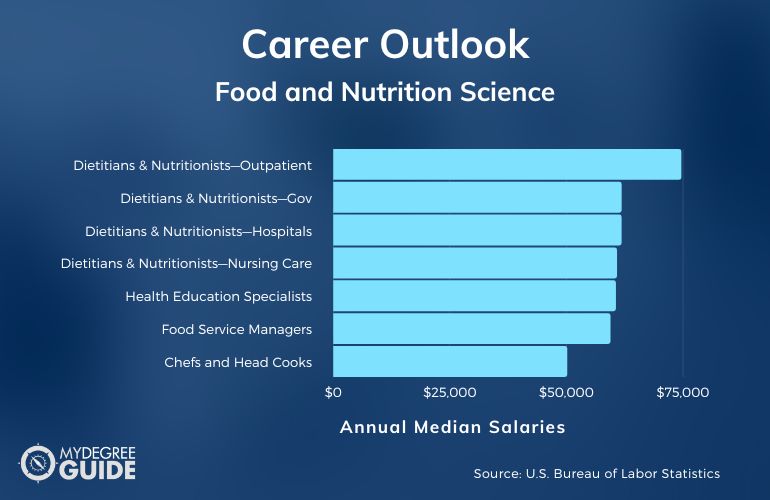Nutrition colleges can enable you to pursue the rewarding path of helping people improve their health by changing their eating habits. Good nutrition is essential for people’s general health and well-being.

As a nutritionist, you can give clients advice about what to eat, and you can help them develop balanced meal plans.
Editorial Listing ShortCode:
If you want to lead a healthy lifestyle and provide others with guidance and encouragement in doing the same, studying nutrition may be the right educational path for you.
Best Universities Offering Bachelors in Nutrition Degree Programs
Methodology: The following school list is in alphabetical order. To be included, a college or university must be regionally accredited and offer degree programs online or in a hybrid format.
Boston University
Boston University offers a Bachelor of Science in Nutrition. Students may choose to follow one of three tracks: Nutrition Science, Nutrition and Health, or Dietetics. To graduate, students must complete 128 credit hours with a minimum GPA of 2.0. Applicants must submit an online application along with their high school transcripts and senior GPA.
Boston University is accredited by the New England Commission of Higher Education.
Brigham Young University
Brigham Young University offers a Bachelor of Science in Nutritional Sciences. To graduate, students must complete 120 credit hours with a minimum GPA of 2.0. A minimum of 30 credits must be received in residence. Those interested in the program must submit their applications through the school’s website.
BYU is accredited by the Northwest Commission on Colleges and Universities.
Case Western Reserve University
Case Western Reserve University offers both a Bachelor of Science and a Bachelor of Arts in Human Nutrition. Both programs require students to complete 120 credit hours. The Bachelor of Arts degree allows students to pursue double majors. Applicants must submit an online application along with an admissions essay and SAT or ACT scores.
Case Western Reserve University is accredited by the Higher Learning Commission.
Clemson University
Clemson University offers a Bachelor of Science in Food Science and Human Nutrition. Students may add a concentration in Food Science and Technology or Nutrition. To graduate, students must complete 123-128 credit hours. Interested applicants must submit an online application, ACT or SAT scores, and a self-reported academic record.
Clemson University is accredited by the Southern Association of Colleges and Schools Commission on Colleges.
Cornell University
Cornell University offers a Bachelor of Science in Nutritional Sciences. Students must complete 120 credit hours to graduate. Those interested in the program must submit an online application along with official high school transcripts, a counselor recommendation, a teacher evaluation, and a mid-year report.
Cornell University is accredited by the Middle States Commission on Higher Education.
Michigan State University
Michigan State University offers a Bachelor of Science in Nutritional Science. Students may choose to add a concentration in Biomedical and Molecular Nutrition, Global Nutrition and Health, or Public Health Nutrition. Applicants may submit an online application along with their official transcripts and an admissions essay.
Michigan State University is accredited by the Higher Learning Commission.
New York University
New York University offers a Bachelor of Science in Nutrition and Food Studies. Students must complete 128 credit hours to graduate. Students can add a concentration in Nutrition and Dietetics or Food Studies. Applicants must submit a self-reported academic record and a mid-year report with their application.
New York University is accredited by the Middle States Commission on Higher Education.
North Carolina State University
North Carolina State University offers a Bachelor of Science in Nutrition Science with a concentration in Applied Nutrition. Students must complete 120 credit hours to graduate. Those interested in the program must submit an online application along with an admissions essay and official transcripts. ACT and SAT scores are not required but may be self-reported.
North Carolina State University is accredited by the Southern Association of Colleges and Schools Commission on Colleges.
Ohio State University
Ohio State University offers a Bachelor of Science in Human Nutrition and Nutrition Science. To graduate, students must complete a professional internship and 120 credit hours with a cumulative GPA of 2.5. Applicants must submit an online application. Standardized test scores are optional but may be submitted.
The Ohio State University is accredited by the Higher Learning Commission.
Oklahoma State University
Oklahoma State University offers a Bachelor of Science in Nutritional Sciences. Students must choose one of the following tracks: Public Health Nutrition, Human Sciences/Pre-Medical Sciences, Allied Health, or Dietetics. Students must complete 120 credit hours to graduate. Applicants must have a high school GPA of 3.0 and submit an admissions essay.
Oklahoma State University is accredited by the Higher Learning Commission.
Pennsylvania State University
Pennsylvania State University offers a Bachelor of Science in Nutritional Sciences. The program offers three tracks: Behavioral Nutrition and Public Health, Nutritional Physiology and Biochemistry, and Nutrition and Dietetics. Applicants must submit a self-reported academic record and official ACT or SAT scores when applying online.
The Pennsylvania State University is accredited by the Middle States Commission on Higher Education.
Purdue University
Purdue University offers an online program for a Bachelor of Science in Nutrition Science. Students must complete 180 quarter credit hours. The program can typically be completed in 4 years. Each class is 10 weeks long. Applicants must have a high school diploma or the equivalent and need to pass a criminal background check.
Purdue University is accredited by The Higher Learning Commission of the North Central Association of Colleges and Schools.
Texas A&M University
Texas A&M University offers a Bachelor of Science in Nutrition. The program offers three tracks: Didactic Program in Dietetics, General Nutrition, or Molecular and Experimental Track. To graduate, students must complete 120 credit hours. Applicants must submit an admissions essay, official test scores, and a self-reported academic record.
Texas A&M University is accredited by the Southern Association of Colleges and Schools Commission on Colleges.
Texas Christian University
Texas Christian University offers a Bachelor of Science Didactic Program in Dietetics. To graduate, students must complete 125 credit hours. Those interested in the program must submit official high school transcripts, an admissions essay, a counselor evaluation, and a teacher evaluation. SAT or ACT scores are optional but encouraged by the program’s admissions department.
Texas Christian University is accredited by the Commission on Colleges of the Southern Association of Colleges and Schools.
University of California – Berkeley
The University of California–Berkeley offers a Bachelor of Science in Dietetics. Students must obtain a total of 120 credit hours with a minimum GPA of 2.0 to graduate. To be eligible for the program, applicants must have a minimum GPA of 3.0 from their final two years in high school.
University of California – Berkeley is accredited by the Western Association of Schools & Colleges.
University of Florida
The University of Florida offers a Bachelor of Science in Nutritional Science. To graduate, students must complete 120 credit hours. To be eligible for the program, applicants must submit copies of their official transcripts, SAT or ACT scores, and a self-reported academic record.
The University of Florida is accredited by the Southern Association of Colleges and Schools Commission on Colleges.
University of Illinois – Urbana Champaign
The University of Illinois offers a Bachelor of Science in Food Science and Human Nutrition: Dietetics. To graduate, students must complete 126 credit hours. Those interested in the program must submit an admissions essay and official high school transcripts. ACT and SAT scores are not required for admission but are needed for scholarships.
The University of Illinois is accredited by the Higher Learning Commission.
University of North Carolina – Chapel Hill
The University of North Carolina—Chapel Hill offers a Bachelor of Science in Public Health in Nutrition. Students may choose to follow the Nutrition Science and Research track or the Nutrition Health and Society track. Those interested in the program must first complete prerequisite courses at the general college. These courses typically take 2 years to complete.
UNC – Chapel Hill is accredited by the Southern Association of Colleges and Schools Commission on Colleges.
University of Texas – Austin
The University of Texas—Austin offers a Bachelor of Science in Nutrition. Students may add a concentration in Dietetics, Nutritional Sciences, Nutrition and Public Health, Honors in Advanced Nutritional Science, Nutrition Honors, or International Nutrition. Applicants must submit an admissions essay, short answer responses, and high school transcripts.
The University of Texas at Austin is accredited by the Southern Association of Colleges and Schools Commission on Colleges.
University of Wisconsin – Madison
The University of Wisconsin—Madison offers a Bachelor of Science in Nutritional Sciences. To graduate, students need to complete 120 credit hours, with at least 30 credits obtained in residence. Those interested in the program must first be accepted into the College of Agricultural and Life Sciences.
The University of Wisconsin – Madison is accredited by the Higher Learning Commission.
Nutrition Colleges

Nutrition colleges and nutrition institutes provide coursework in subjects such as:
- Biology
- Chemistry
- Biochemistry
- Anatomy and physiology
- Food science
- Food delivery systems
- Life cycle nutrition
Studying these subjects can help you better understand how different types of food and ingredients affect the human body. You can study what macronutrients and micronutrients are necessary for human health as well as which ingredients can have adverse affects on human health.
You can also learn about different approaches to dieting and meal planning, including special diets to accommodate food allergies and intolerances. You can learn how to help your clients get all the vitamins and nutrients they need to be healthy, even while following a diet to lose weight or having other limitations on what they can eat.
Many colleges for nutrition also include coursework in the social sciences and public health. This can allow you to learn about poverty, food deserts, child neglect, and other social problems that can create barriers to people receiving proper nutrition.
In addition to completing academic coursework, a nutrition college with a coordinated program will also have you complete an internship under the supervision of a licensed nutritionist. Completion of an internship is a requirement to obtain licensure.
Some nutritionist colleges use didactic programs, which means they only teach the academic knowledge necessary to pass licensure exams. In didactic programs, graduates are responsible for finding their own internships.
Food and Nutrition Science Careers & Salaries

The most likely career path for graduates of colleges for nutrition is to become a licensed nutritionist or dietitian. Nutritionists and dietitians are commonly employed in outpatient care centers, government, hospitals, or nursing and residential care facilities. Since everyone needs to eat, there is a high demand for food and nutrition science workers.
According to the Bureau of Labor Statistics, here are some occupations related to food and nutrition science, along with their median annual salaries.
| Careers | Annual Median Salaries |
| Dietitians and Nutritionists—Outpatient Care Centers | $74,640 |
| Dietitians and Nutritionists—Government | $61,830 |
| Dietitians and Nutritionists—Hospitals | $61,820 |
| Dietitians and Nutritionists—Nursing and Residential Care Facilities | $60,840 |
| Health Education Specialists |
$60,600 |
| Food Service Managers | $59,440 |
| Chefs and Head Cooks | $50,160 |
| Community Health Workers | $46,590 |
| Cooks | $29,120 |
| Food Preparation Workers | $28,780 |
Dietitians and nutritionists who work in outpatient care centers focus on individual patients, helping them plan healthy meals to eat at home. Those who work in hospitals, nursing homes, and residential care facilities may also work with food service workers at those facilities to plan menus for the residents as a group. Professionals who work in government are often primarily concerned with public health and education.
Nutrition Bachelor’s Curriculum & Courses

Here are some examples of the type of courses you might take while majoring in nutrition:
- Nutrition: In this course, you’ll study the basics of what nutrients humans need in order to be healthy.
- Food Science: In this course, you’ll study the chemistry of different kinds of foods and learn about how different foods affect the human body.
- Food Science Lab: In this course, you’ll complete hands-on activities that demonstrate the principles you are studying in food science.
- Dietary Patterns: In this course, you’ll study different types of eating habits that people may engage in.
- Human Nutrition: Energy, Protein, Minerals: In this course, you’ll learn about how food fuels the body and about the health benefits of protein and different kinds of minerals.
- Human Nutrition: Vitamins: In this course, you’ll learn about different types of vitamins and the role they play in human health.
- Healthy Lifestyles as Preventive Medicine: In this course, you’ll study how poor dietary, sleep, and exercise habits can lead to health problems as well as how to use improvements in these habits to help prevent health problems.
- Child Nutrition, Development, and Health: In this course, you’ll learn about how children’s dietary needs differ from those of adults and how children’s needs change as they grow.
- Nutrition Communication, Counseling, and Behavior Change Strategies: In this course, you’ll explore how to explain things clearly to laypeople and how to help clients formulate effective plans for improving their dietary habits.
- Capstone Experience: In this course, you’ll complete a project to demonstrate what you have learned about nutrition.
Exact course titles and requirements will vary at different colleges and universities. Many nutrition degree programs also include an internship.
How to Choose a College for a Nutrition Degree

Schools with nutrition majors are all a little bit different. Here are some factors to consider when trying to find the best school for you:
- Is the school accredited? You may prefer to study at a college that has received institutional accreditation from a regional accrediting agency. You might also want to look for nutrition programs that have received programmatic accreditation from the Accreditation Council for Education in Nutrition and Dietetics.
- Does the program include an internship? Completion of an internship is an essential step toward licensure. You may be able to find your own internship, but attending a school that includes one in their program could make things simpler.
- Does the program include research opportunities? This may be important to you if you plan to go on to graduate school.
- What concentration options are available? Some schools allow you to choose a nutrition concentration or specialization if there is a specialty area that interests you.
Determining which factors are most important to you can help you narrow down your program options.
Colleges with Nutrition Majors Admissions Requirements

Whether or not you get accepted into a school depends on a combination of factors. Here are some common admissions requirements of schools for nutrition:
- High school diploma
- Official transcripts
- Personal essay
- List of extracurriculars
Some schools may also ask you to submit SAT or ACT scores, but a growing number of schools are no longer requiring this. Schools may take into account recommendations from teachers or counselors as well.
Colleges with Nutrition Programs Accreditation

When considering different colleges and universities where you could earn your nutrition degree, you may want to pay attention to each prospective school’s accreditation status. You can usually discover this status when visiting a school’s website.
If a school has received regional accreditation, this means that it has been thoroughly evaluated by an outside agency to ensure that it meets certain standards. Attending an accredited school can be a precondition for receiving some types of financial aid, and it may also make it easier to transfer to a new school if needed. You can learn more about regional accreditation by visiting the US Department of Education’s website.
What Is a Major in Nutrition?

A nutrition major is a program of study that teaches how different types of nutrients affect the human body and how various dietary habits can improve human health. It may also include coursework in biology, chemistry, and social sciences.
This major might be a good fit if you are scientifically minded and also care about helping people on a personal level. This major is usually intended to prepare you for a career as a nutritionist or dietitian. These professionals typically work with clients to help them make healthy lifestyle changes.
Is Nutrition a Good Major?
Yes, nutrition is a good major for many undergraduate students. Many people find nutrition to be a rewarding field of study because it enables them to help people prevent health problems and improve their general well-being.
Nutrition is also a growing field. The Bureau of Labor Statistics currently projects that employment of dietitians and nutritionists will grow by 11% over the next decade. With such a positive job outlook, now may be a strategic time to get your degree in nutrition.
What’s the Difference Between a Dietitian vs. Nutritionist?

Here are some differences between dietitians and nutritionists:
- Dietitians: Dietitians use diet to treat specific illnesses and health concerns. They must be registered with the Commission on Dietetic Registration (CDR) to use the title registered dietitian, and they are often subject to more legal oversight that nutritionists.
- Nutritionists: Nutritionists often dispense general healthy eating advice to help people ensure that they are getting all the nutrients they need.
While the terms “dietitian” and “nutritionist” are sometimes used interchangeably, these professions are not exactly the same.
Earning Your Nutrition Degree Online

With a degree in nutrition, you can prepare yourself to pursue a career as a nutritionist or dietitian. Knowledge of nutrition could also be useful if you want to pursue a career in a related field, such as medicine or public health.
There are many online nutrition degree programs that can provide you with added flexibility. If your online dietetics degree program includes an internship, you can often arrange to complete it locally.
Why not start exploring accredited universities today? The sooner you find the nutrition program that’s best for you, the sooner you can begin your educational journey.
